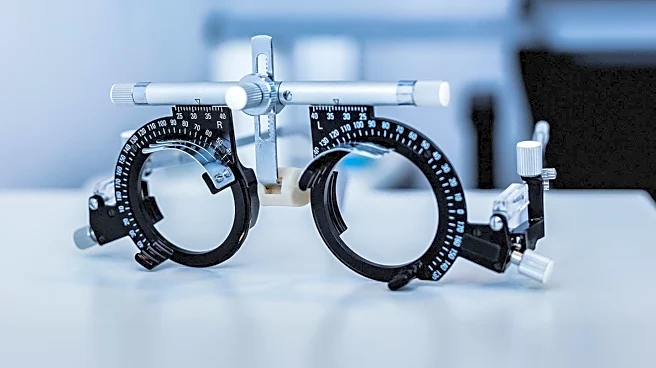What's Happening?
Aurion Biotech has announced the successful completion of its Phase 1/2 CLARA trial, which evaluated the safety, efficacy, and tolerability of AURN001, a regenerative cell therapy for corneal endothelial
disease. The trial results, presented at the American Academy of Ophthalmology meeting, showed significant improvements in visual acuity and corneal thickness among patients treated with the high-dose AURN001 therapy. The study involved 97 patients across 20 sites in the U.S. and Canada, demonstrating a dose-dependent response with the highest efficacy observed in the high-dose group. The therapy, which uses cultured human corneal endothelial cells, aims to address the shortage of donor tissues for corneal transplants.
Why It's Important?
The successful trial results are a significant step forward in addressing corneal endothelial disease, which affects millions worldwide and leads to progressive vision loss. Current treatments are limited by donor shortages, making Aurion Biotech's cell therapy a potentially transformative solution. The therapy's ability to produce up to 1,000 doses from a single donor line could revolutionize treatment availability, offering hope to many patients. The trial's success also supports the advancement to a pivotal Phase 3 trial, which could further validate the therapy's effectiveness and safety, potentially leading to widespread adoption and commercialization.
What's Next?
Aurion Biotech plans to launch a U.S. pivotal Phase 3 trial in the first half of 2026, aiming to further establish the efficacy and safety of AURN001. The company has already received Regenerative Medicine Advanced Therapy and Breakthrough Therapy Designation from U.S. regulatory bodies, highlighting the therapy's potential impact. As the trial progresses, stakeholders including healthcare providers, patients, and regulatory agencies will closely monitor developments, which could lead to new treatment standards for corneal endothelial disease.
Beyond the Headlines
The development of AURN001 not only addresses a critical medical need but also represents a significant advancement in regenerative medicine. The therapy's success could pave the way for similar approaches in treating other conditions with limited donor availability. Ethical considerations regarding the use of cultured human cells and the potential for mass-scale cell therapy production will likely be topics of discussion as the therapy moves closer to commercialization.









